(完整word版)高三一轮语法复习--虚拟语气
- 格式:doc
- 大小:92.51 KB
- 文档页数:7
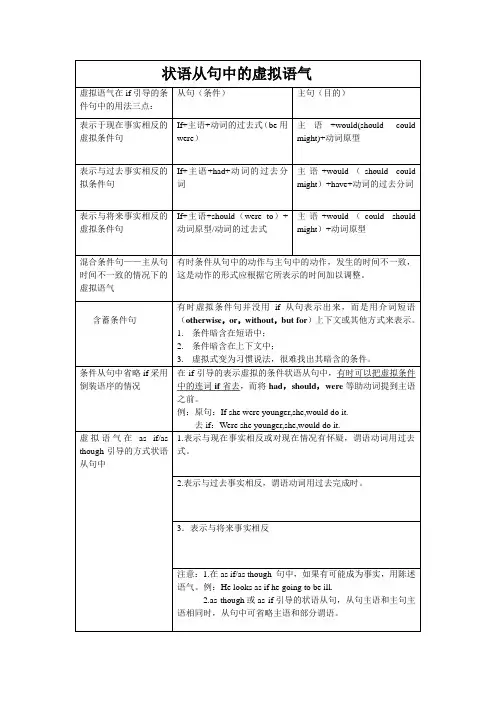
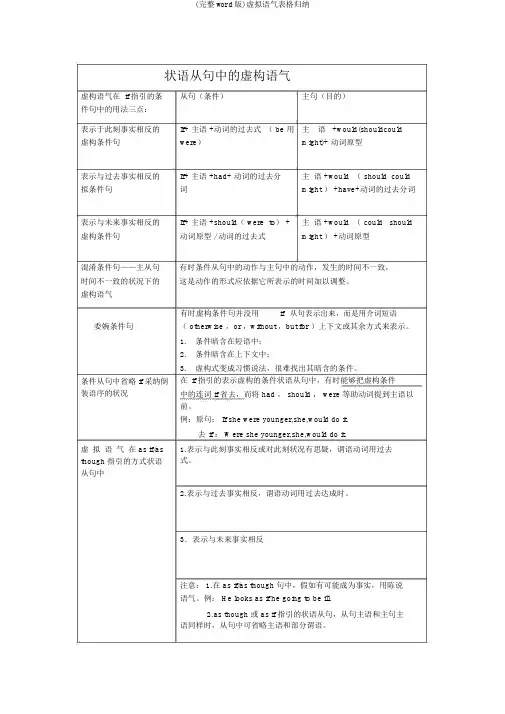
状语从句中的虚构语气虚构语气在 if 指引的条从句(条件)主句(目的)件句中的用法三点:表示于此刻事实相反的If+ 主语 +动词的过去式( be 用主语 +would(shouldcould虚构条件句were)might)+ 动词原型表示与过去事实相反的If+ 主语 +had+ 动词的过去分主语 +would ( should could 拟条件句词might ) +have+动词的过去分词表示与未来事实相反的If+ 主语 +should( were to) + 主语 +would ( could should 虚构条件句动词原型 / 动词的过去式might ) +动词原型混淆条件句——主从句有时条件从句中的动作与主句中的动作,发生的时间不一致,时间不一致的状况下的这是动作的形式应依据它所表示的时间加以调整。
虚构语气有时虚构条件句并没用if从句表示出来,而是用介词短语委婉条件句( otherwise ,or ,without ,but for )上下文或其余方式来表示。
条件从句中省略 if 采纳倒装语序的状况虚拟语气在 as if/as though 指引的方式状语从句中1.条件暗含在短语中;2.条件暗含在上下文中;3.虚构式变成习惯说法,很难找出其暗含的条件。
在if 指引的表示虚构的条件状语从句中,有时能够把虚构条件中的连词 if 省去,而将 had , should , were 等助动词提到主语以前。
例:原句: If she were younger,she,would do it.去if : Were she younger,she,would do it.1.表示与此刻事实相反或对此刻状况有思疑,谓语动词用过去式。
2.表示与过去事实相反,谓语动词用过去达成时。
3.表示与未来事实相反注意: 1.在 as if/as though 句中,假如有可能成为事实,用陈说语气。
例: He looks as if he going to be ill.2.as though 或 as if 指引的状语从句,从句主语和主句主语同样时,从句中可省略主语和部分谓语。
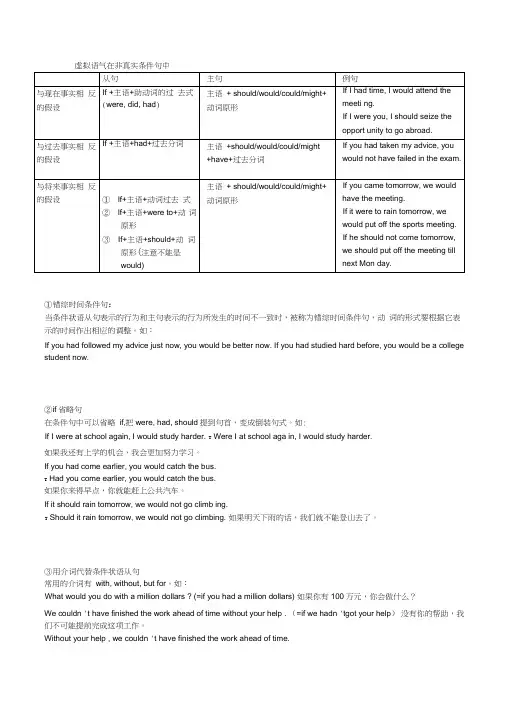
①错综时间条件句:当条件状语从句表示的行为和主句表示的行为所发生的时间不一致时,被称为错综时间条件句,动词的形式要根据它表示的时间作出相应的调整。
如:If you had followed my advice just now, you would be better now. If you had studied hard before, you would be a college student now.②i f省略句在条件句中可以省略if,把were, had, should提到句首,变成倒装句式。
如:If I were at school again, I would study harder. T Were I at school aga in, I would study harder.如果我还有上学的机会,我会更加努力学习。
If you had come earlier, you would catch the bus.T Had you come earlier, you would catch the bus.如果你来得早点,你就能赶上公共汽车。
If it should rain tomorrow, we would not go climb ing.T Should it rain tomorrow, we would not go climbing. 如果明天下雨的话,我们就不能登山去了。
③用介词代替条件状语从句常用的介词有with, without, but for。
如:What would you do with a million dollars ? (=if you had a million dollars) 如果你有100万元,你会做什么?We couldn 't have finished the work ahead of time without your help . (=if we hadn 'tgot your help)没有你的帮助,我们不可能提前完成这项工作。
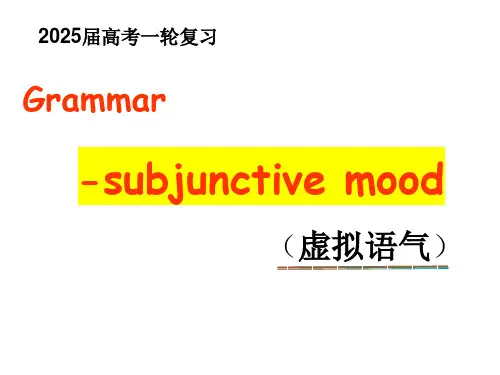
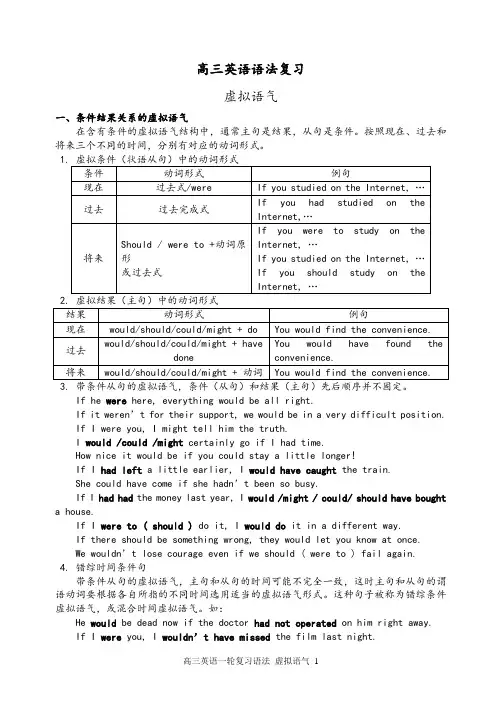
高三英语语法复习虚拟语气一、条件结果关系的虚拟语气在含有条件的虚拟语气结构中,通常主句是结果,从句是条件。
按照现在、过去和将来三个不同的时间,分别有对应的动词形式。
If he were here, everything would be all right.If it weren’t for their support, we would be in a very difficult position.If I were you, I might tell him the truth.I would /could /might certainly go if I had time.How nice it would be if you could stay a little longer!If I had left a little earlier, I would have caught the train.She could have come if she hadn’t been so busy.If I had had the money last year, I would /might / could/ should have bought a house.If I were to ( should ) do it, I would do it in a different way.If there should be something wrong, they would let you know at once.We wouldn’t lose courage even if we should ( were to ) fail again.4. 错综时间条件句带条件从句的虚拟语气,主句和从句的时间可能不完全一致,这时主句和从句的谓语动词要根据各自所指的不同时间选用适当的虚拟语气形式。
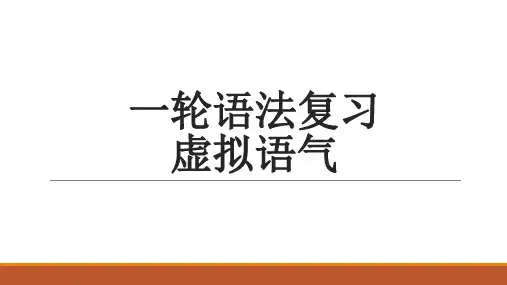
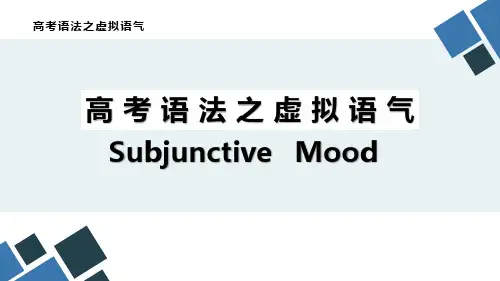
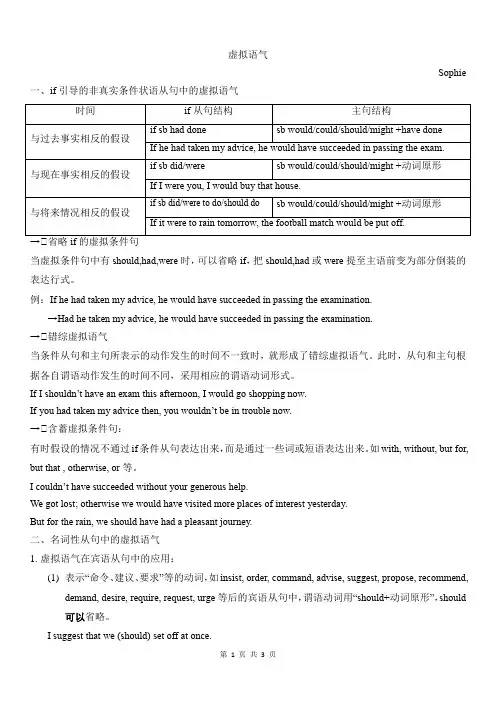
虚拟语气Sophie 一、if引导的非真实条件状语从句中的虚拟语气时间if从句结构主句结构与过去事实相反的假设if sb had done sb would/could/should/might +have done If he had taken my advice, he would have succeeded in passing the exam.与现在事实相反的假设if sb did/were sb would/could/should/might +动词原形If I were you, I would buy that house.与将来情况相反的假设if sb did/were to do/should do sb would/could/should/might +动词原形If it were to rain tomorrow, the football match would be put off.当虚拟条件句中有should,had,were时,可以省略if,把should,had或were提至主语前变为部分倒装的表达行式。
例:If he had taken my advice, he would have succeeded in passing the examination.→Had he taken my advice, he would have succeeded in passing the examination.→①错综虚拟语气当条件从句和主句所表示的动作发生的时间不一致时,就形成了错综虚拟语气。
此时,从句和主句根据各自谓语动作发生的时间不同,采用相应的谓语动词形式。
If I shouldn’t have an exam this afternoon, I would go shopping now.If you had taken my advice then, you wouldn’t be in trouble now.→①含蓄虚拟条件句:有时假设的情况不通过if条件从句表达出来,而是通过一些词或短语表达出来。
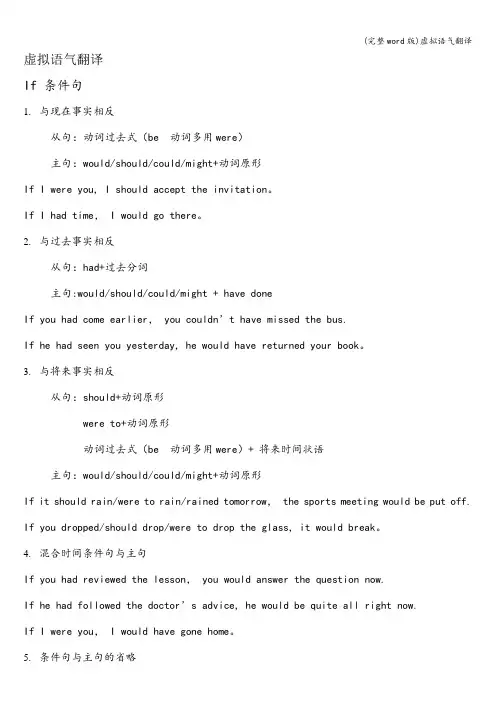
虚拟语气翻译If 条件句1.与现在事实相反从句:动词过去式(be 动词多用were)主句:would/should/could/might+动词原形If I were you, I should accept the invitation。
If I had time, I would go there。
2.与过去事实相反从句:had+过去分词主句:would/should/could/might + have doneIf you had come earlier, you couldn’t have missed the bus.If he had seen you yesterday, he would have returned your book。
3.与将来事实相反从句:should+动词原形were to+动词原形动词过去式(be 动词多用were)+ 将来时间状语主句:would/should/could/might+动词原形If it should rain/were to rain/rained tomorrow, the sports meeting would be put off. If you dropped/should drop/were to drop the glass, it would break。
4.混合时间条件句与主句If you had reviewed the lesson, you would answer the question now.If he had followed the doctor’s advice, he would be quite all right now.If I were you, I would have gone home。
5.条件句与主句的省略I would /should have it, but I was too busy then。
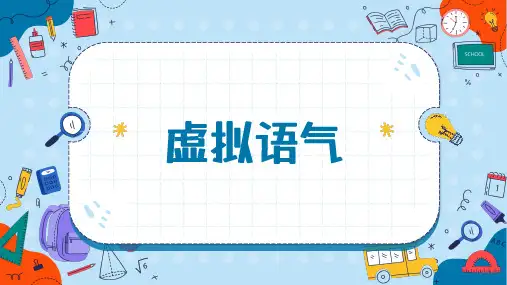
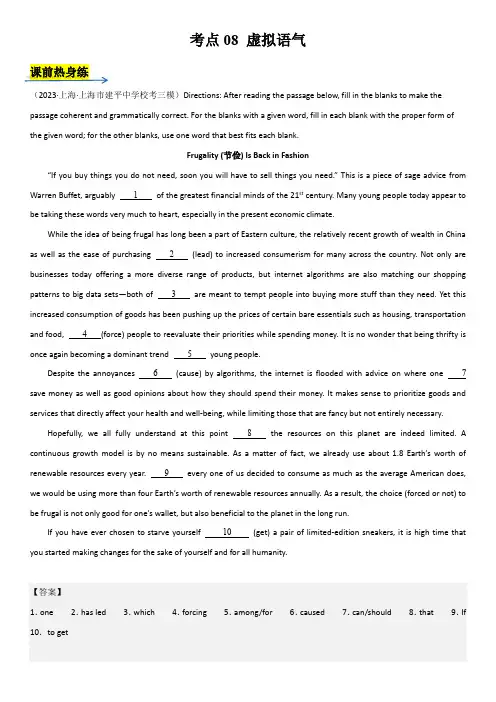
考点08 虚拟语气课前热身练(2023·上海·上海市建平中学校考三模)Directions: After reading the passage below, fill in the blanks to make the passage coherent and grammatically correct. For the blanks with a given word, fill in each blank with the proper form of the given word; for the other blanks, use one word that best fits each blank.Frugality (节俭) Is Back in Fashion“If you buy things you do not need, soon you will have to sell things you need.” This is a piece of sage advice from Warren Buffet, arguably 1 of the greatest financial minds of the 21st century. Many young people today appear to be taking these words very much to heart, especially in the present economic climate.While the idea of being frugal has long been a part of Eastern culture, the relatively recent growth of wealth in China as well as the ease of purchasing 2 (lead) to increased consumerism for many across the country. Not only are businesses today offering a more diverse range of products, but internet algorithms are also matching our shopping patterns to big data sets—both of 3 are meant to tempt people into buying more stuff than they need. Yet this increased consumption of goods has been pushing up the prices of certain bare essentials such as housing, transportation and food, 4 (force) people to reevaluate their priorities while spending money. It is no wonder that being thrifty is once again becoming a dominant trend 5 young people.Despite the annoyances 6 (cause) by algorithms, the internet is flooded with advice on where one 7 save money as well as good opinions about how they should spend their money. It makes sense to prioritize goods and services that directly affect your health and well-being, while limiting those that are fancy but not entirely necessary.Hopefully, we all fully understand at this point 8 the resources on this planet are indeed limited. A continuous growth model is by no means sustainable. As a matter of fact, we already use about 1.8 Earth’s worth of renewable resources every year. 9 every one of us decided to consume as much as the average American does, we would be using more than four Earth’s worth of renewable resources annually. As a result, the choice (forced or not) to be frugal is not only good for one’s wallet, but also beneficial to the planet in the long run.If you have ever chosen to starve yourself 10 (get) a pair of limited-edition sneakers, it is high time that you started making changes for the sake of yourself and for all humanity.【答案】1.one 2.has led 3.which 4.forcing 5.among/for 6.caused 7.can/should 8.that 9.If 10.to get【导语】本文是一篇说明文。
高中英语语法-虚拟语气全总结虚拟语气通常用于表达与现实相反的假设情况。
在非真实条件句中,虚拟语气的形式有两种:与现在事实相反的假设和与过去或将来事实相反的假设。
与现在事实相反的假设通常使用if+主语+助动词的过去式(如were。
did。
had)+动词原形,主句则使用XXX动词原形。
例如:If I had time。
I would XXX。
如果我有时间,我会参加会议。
与过去或将来事实相反的假设则有三种形式:①if+主语+动词过去式;②if+主语+wereto+动词原形;③if+主语+should+动词原形(注意不能是would)。
主句同样使用XXX动词原形。
例如:If you had taken my advice。
you would not have failed in the exam。
如果你听了我的建议,你就不会在考试中失败了。
在错综时间条件句中,动词形式要根据表示时间的状语从句作出相应的调整。
另外,在条件句中可以省略if,把were、had、should提到句首,变成倒装句式。
例如:Were I at school again。
I would study harder。
如果我还有上学的机会,我会更加努力研究。
Had you arrived earlier。
you would have caught the bus.If it rains tomorrow。
XXX climbing.What would you do with a n dollars?We couldn't have finished the work ahead of time without your help.Otherwise。
I would have taken part in the sports meeting.XXX me of your birthday。
or else I would have known nothing about it.A man who s drinking water would be dead in about seven days.I might have been XXX assistance。
高中英语语法讲解--虚拟语气1. 语气的定义和种类(1)语气的定义语气是动词的一种形式,它表示说话人对某一行为或事情的看法和态度。
(2)语气的种类A. 陈述语气表示动作或状态是现实的、确定的或符合事实的,用于陈述句、疑问句和某些感叹句。
We are not ready.Did it rain all day yesterday?What a fine day today!B. 祈使语气表使说话人的建议、请求、邀请、命令等。
Be careful.Don’t forget to clo se the window.Open the door, please.C. 虚拟语气表使动作或状态不是客观存在的事实,而是说话人的主观愿望、假设或推测等。
2. 虚拟语气一. 虚拟语气在条件句中的应用学习虚拟语气在条件句中的用法之前我们必须清楚条件句的种类:条件句有真实条件句与非真实条件句(或称虚拟条件句)两种。
真实条件句所表的假设是可能发生或实现的,句中的条件从句与结果主句都用陈述语气。
如:If it doesn’t rain tomorrow, I will go for a picnic. 假若明天不下雨,我就去野餐。
Oil floats if you pour it on water. 你如把油倒在水里,油就浮起来。
虚拟条件句所表的假设则是不可能或不大可能发生或实现的,句中的条件从句与结果主句皆须用虚拟语气。
条件从句主句与现在事实相违背过去式(动词是be用were)should / would/could/might + 动词原形与过去事实相违背had + 过去分词should / would/could/might + have +过去分词与未来事实相违背1) should + 动词原形2) were + 动词不定式3) 过去式(动词是Be也可以用were)should / would/could/might + 动词原形1. 与现在事实相反的虚拟条件句,条件从句的谓语用动词的过去式(be的过去式用were), 主句的谓语用should (would, might,could)+动词原形。
高三英语语法复习虚拟语气一、条件结果关系的虚拟语气在含有条件的虚拟语气结构中,通常主句是结果,从句是条件。
按照现在、过去和将来三个不同的时间,分别有对应的动词形式。
If he were here, everything would be all right.If it weren’t for their support, we would be in a very difficult position.If I were you, I might tell him the truth.I would /could /might certainly go if I had time.How nice it would be if you could stay a little longer!If I had left a little earlier, I would have caught the train.She could have come if she hadn’t been so busy.If I had had the money last year, I would /might / could/ should have bought a house.If I were to ( should ) do it, I would do it in a different way.If there should be something wrong, they would let you know at once.We wouldn’t lose courage even if we should ( were to ) fail again.4. 错综时间条件句带条件从句的虚拟语气,主句和从句的时间可能不完全一致,这时主句和从句的谓语动词要根据各自所指的不同时间选用适当的虚拟语气形式。
这种句子被称为错综条件虚拟语气,或混合时间虚拟语气。
如:He would be dead now if the doctor had not operated on him right away.If I were you, I wouldn’t have missed the film last night.If you were in better health, we would have allowed you join them in the work.If we hadn’t been working hard in the past few years, things wouldn’t be going so smoothly.If my grandfather were alive, he would have been 100 next year.5. 含蓄条件句有时,虚拟条件不一定是由if引导的条件从句,而是其他形式,或者可能根据上下文省略了条件,或者隐含在文字中,这种条件虚拟语气,称为含蓄条件虚拟语气。
这时表示结果的句子要根据自身的时间来确定动词的形式。
If not for their help, the situation would never have been what it is today.(省略句)Born in better times, he would have achieved more in science.(过去分词表示条件)He would be stupid not to accept that suggestion.(不定式表示条件)This same thing, happening in wartime, would amount to disaster.(现在分词表示条件)Without power, there would be no modern industry.(介词短语表示条件)But for the storm, we should have arrived earlier.(介词短语表示条件)We would have done better under more favorable conditions.(more隐含条件)A less difficult problem would have been solved.(less隐含条件)That would have been considered a miracle in the past.(in the past如果在过去)I was ill that day. Otherwise I would have attended the lecture.(otherwise 如果不是这样)We would have given you more help, but he has been so busy.(事实反衬虚拟条件)Anyone else in my position would have done the same.(else隐含条件)A different word would have settled the quarrel.(different隐含条件)Another inch forward, and the snake would have struck.(如果再向前一点点)二、状语从句中的虚拟语气1. 让步条件状语从句中的虚拟语气:even if /even though引导让步条件,主句和从句都用虚拟语气,动词形式分别对应于带条件从句的主句和从句。
如:Even if my mother were here, I would /should say the same thing.Even though it had been a rainy day, I should have gone to see him.2. 方式状语从句中的虚拟语气:as if /as though引导方式状语从句,如果是非真实的情况,也使用虚拟语气。
He treats me as if I were a stranger. (从句动词与主句时间相同)He talked as if he were the witness himself.(从句动词与主句时间相同)They talked as if they had been friends for years.(从句时间先于主句)Why is she looking at me as though she had seen me before? (从句时间先于主句)三、虚拟语气在名词性从句中的应用1. 在动词wish 后的宾语从句中,表示与现在或过去的事实相反、或对于将来的主观愿望,从句通常省略连词that。
should可以省略。
如:I propose that we (should ) set a dead line for handing in the plans.He insisted that we take up the matter at the meeting.He ordered that the letter be mailed at once.The law r equires that everyone take a test for a driver’s license.I think it advisable that he have his car serviced.The United Nations urged that he withdraw his troops.I move / recommend that he go there.常用于主句的谓语动词有:ask, decide, demand, desire, insist, move, order, prefer, propose, request, require, suggest, urge, instruct, persuade, dictate, determined, beg, advise, resolve, intend, argue, maintain, deserve, promise, arrange,等。
以上动词改为被动语态之后,成为It is / was that…的复合句,原来的宾语从句变为主语从句,原有的谓语动词仍然为should +动词原形,should可以省略。
如:It is requested that Mary should give a performance at the party.It is desired that we get everything ready by tonight.It has been decided that the meeting be postponed till next Friday.以上动词如果有对应的形容词,做表语时,其主语从句也有同样的虚拟语气要求;以上动词对应名词的同位语从句,也有同样的虚拟语气要求。
3. It is + adj. that结构中,that为主语从句,从句中的动词用should + 动词原形,表示“应当”的意思,should可以省略。
这类形容词常见的有:compulsory, crucial, essential, obligatory, urgent, necessary,以及表示命令、建议、要求等意义的形容词。
It is important that unite with all that can be united in the work.It is necessary that he be sent there at once.4. It is + adj. that结构中,that为主语从句,从句中的动词用should + 动词原形,should表示惊讶、失望、欣慰、疑惑等语气,不可以省略。
It is a great pity that he should be so conceited.It’s strange that she should have failed to see her own shortcomings.It was extraordinary to me that you should have seen this.It is no wonder that he should be so angry.He just couldn’t believe that the new stadium should be so large.I am sorry that he should be in such poor health.We were surprised that he should be so stubborn.I am still not quite convinced that she should have done so much in such a short time.四、其它句型中的虚拟语气1. 在would rather, would sooner, had better, would as soon, just as soon 的句型中,接动词原形,指现在和将来时间,表示一种主观愿望和选择。